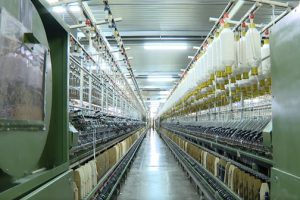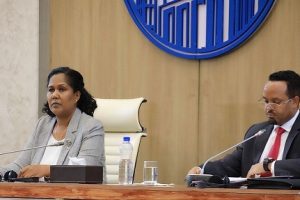BY BACHA ZEWDIE
The development of industrial parks is one of the activities that the government has focused on that will contribute to the realization of the economic structural transformation. Apart from creating a favorable environment for the manufacturing industry, the parks will also contribute greatly to the national economic development by creating job opportunities for the community living in the areas where they are built and creating an environmentally friendly working environment.
Among the things that make industrial parks preferable are the fact that they provide many services in one place, build appropriate infrastructure and connect with other manufacturers. From this point of view, efforts have been made to encourage large international companies to open their factories in Ethiopia by establishing many industrial parks in Ethiopia as well as by providing extensive manpower and electricity supply, tax-free importation of machinery, credit provision, one-center service and infrastructure construction.
Currently, there are 13 industrial parks across the country; the parks are contributing significantly to the growth of the national economy through job creation, foreign direct investment and technology transfer. In general, results have been found in the development of industrial parks, which are believed to play an important role in facilitating the efforts to make Ethiopia the manufacturing hub of Africa.
Sandokan Debebe, CEO of the Industrial Parks Development Corporation, which oversees the industrial parks in various areas of Ethiopia, in a recent statement to the media regarding the corporation’s performance in the 2014 fiscal year, announced that the corporation has achieved good performance amid many national and international challenges.
Current conditions, challenges and plans for the fiscal year
The implementation of the corporation’s plan for the fiscal year was influenced by the prevailing national and international conditions. The plan assumed that industrial parks in the northern part of Ethiopia would come into operation. However, since peace and stability are directly related to investment activities, the peace and security situation in the area had a significant negative impact on the plan. The security breach has put the big manufacturing companies in the corporation under a lot of pressure. Following the instability, the foreign media as well as the campaign and pressure of the international community have had an impact on the production organizations not to work calmly and new investments not to come easily to Ethiopia. It was also a year when the embassies were putting a lot of pressure on their citizens to leave Ethiopia, so the producers were forced to work under pressure.
Companies operating in industrial parks and supplying their products to international markets were pressured to transfer their products to branch factories in other countries because they supply their products to buyers under long-term procurement contracts; Purchases were also canceled. Since there was a national survival enforcement campaign in the fiscal year, the overall government activity survey was focused on law and order enforcement activities, which had an impact on development activities.
On the other hand, the new legal reforms implemented, especially the new guidelines regarding the use of foreign currency, have had their own positive and negative effects on the investment activity.
Global conditions also exerted significant pressure on investment activities. In this regard, the COVID-19 pandemic is mentioned. As most of the investment in industrial parks comes from Asia, the restrictions on the corona activity have affected the investment flow. The Ukraine-Russia war has also put pressure on the value chain and has had an impact on the investment flow as it has prevented manufacturing companies from expanding their investments to the desired level.
Due to the prevailing national and international conditions, the Foreign Direct Investment (FDI) registered in the fiscal year is low.
There are also barriers to providing basic services to manufacturing companies. Among them, power supply, compensation and claims, finance, are the main problems.
Plan implementation and recorded results
Industrial parks have three main basic missions. These are to attract foreign direct investment, expand job creation and carry out technology transfer.
Regarding employees, according to data compiled up to June 30, 2014, there are 81,000 employees directly engaged in production activities in industrial parks. This number does not include people outside the parks who have been indirectly employed. Many job opportunities have been created in this process as the manufacturers located in the industrial parks have working relationships with individuals and organizations outside the parks. For example, there are more than 410 cross-country vehicles that provide transportation services for 23,000 workers located in Bole Lemi Industrial Park. There are more than 230 buses in Hawassa Industrial Park. In addition to the other services offered to the workers, it can be seen that the parks have indirectly created many job opportunities.
In fiscal year 2014, industrial parks created more than 57,000 jobs. Since the industrial parks started working, products worth more than 61 billion Birr have been offered to the local and international markets. It was planned to market products worth 412 million Dollars in the fiscal year and 357 million Dollar (18.5 billion Birr) was achieved. Of this, 196 million Dollar (10.3 billion birr) was obtained from products offered to the foreign market, which showed an eight percent growth from last year. In general, from the time the parks started working, until June 30, 2014, the value of the products offered to the foreign market and obtained through substitute products has reached one point one billion Dollars. Of this, $930 million came from exports.
Import Substitution is another sector that has received great attention and good results in the last two years. In particular, the corporation is paying attention to the issue in accordance with the direction set to support local companies to engage in the production of substitute products. Out of the 357 million Dollar worth of industrial park products that were marketed in the fiscal year, 161 million Dollars were from the domestic market. Thus, 96 percent of the plan has been achieved. Among the products offered to the domestic market are pharmaceutical products, construction materials, chemical products, information technology equipment and clothing.
One of the challenges that prevent the industrial parks from achieving the desired results is the problem of supply and linkage. As most of the manufacturing companies are foreign organizations, they supply their products to the foreign market. As they are unable to supply the required amount of inputs from the country, they bring up to 85 percent of their production inputs from abroad. In the fiscal year, it was possible to provide inputs worth more than 69 million Dollars to manufacturers from the country. This performance was recorded as the best ever. The companies are increasing the possibility of not importing the inputs that are allowed to be imported according to the guidelines on the use of foreign currency, when they are locally produced.
In terms of attracting new investments, 14 production sheds are planned to be handed over to manufacturers and 13 sheds have been provided to manufacturers. Out of a total of 177 production sheds, 151 have been contractually handed over to investors.
During the fiscal year, more than six hectares of cultivated land was provided for new investments in Bole Lemi, Jimma, Kilinto and other parks. The total land that has been transferred to investors from the mine land is 12.5 hectares. The corporation has till now more than 526 hectares of cultivated land. This shows that 87 percent of the uncultivated land has not yet been transferred to producers. In fact, apart from renting out sheds, the corporation has started offering cultivated lands only two years ago.
The corporation plans to earn one point four billion Birr from the services it provides (office, shed rental, arable land supply and other services) in the fiscal year, and by earning one point two billion Birr, it has been able to record the highest income it has received so far. The corporation, which has been in loss for the past seven years, recorded a profit of more than 330 million Birr in the fiscal year 2014 by carefully managing its budget and expanding its sources of income.
Efforts to attract local companies to industrial parks are yielding encouraging results. Previously, there were few sectors in which manufacturers were engaged in the parks. Improvements to the feasibility study are underway to expand the diversity of the sectors and market access.
If the industrial parks of Mekelle, which stopped production due to security problems, including the Bahirdar Industrial Park where the rocket attack took place, the damaged Kombolcha and Semera industrial parks, which did not start production, would have been able to record even better performance.
One of the problems faced during the fiscal year was the water supply problem in Diredawa Industrial Park, which has now been converted into a free trade zone. One of the main services offered to investors in industrial parks is water supply. “Due to the geographical location of the area, it is difficult to find water in the Diredawa Industrial Park zone and it is necessary to go ten kilometers away, so this year we have made the park/zone have water service by carrying out works to supply water to the park.”
Kombolcha Industrial Park was heavily damaged by the invading force. The damage to the industrial park can be explained in two ways. One is when the corporation’s wealth is destroyed and looted. Another form of damage is looting/vandalism of manufacturing companies operating in the park. This was greatly improved and it was brought back to work within a month.
After it was decided to manage the Information Communication Technology Park (ICT Park) by the Industrial Parks Development Corporation, which was started under the management of the former Ministry of Information Communication Technology, the corporation has carried out various activities to achieve the plan. When the corporation took over the park, there were incomplete infrastructures, interrupted constructions, lack of consultants and other problems. The corporation has designed a business portfolio that will allow infrastructures to be completed and management systems to be developed and put into operation properly. In the future, by completing more infrastructures, it will be able to create better job opportunities and earn foreign currency.
Next areas of focus
The corporation is also making efforts to implement operational improvements that keep up with the times. The Diredawa Free Trade Zone, which is the result of the corporation’s research and started its work, recently, is mentioned as an example of this. The process of turning industrial parks into Special Economic Zones will be strengthened.
The government company called Industrial Project Service, which has been doing consultancy, research and training for several years, was decided to work with the corporation three years ago and carried out feasibility studies, resource estimation, corporate reform and training, and these will continue to be strengthened.
The CEO Sandokan Debebe said, “In the last few years, billions of Dollar have been spent and 13 industrial parks which are mega projects have been built and put into operation. Other bodies including the Ministry of Finance have testified that the corporation has a successful performance in terms of project management,” he said. The chief executive said that it is known that it is not an easy task to build every industrial park and put it into operation. Based on this experience, the Industrial Parks Development Corporation will work to generate wealth by consulting and assisting the projects of other institutions in addition to the corporation.
THE ETHIOPIAN HERALD FRIDAY 16 SEPTEMBER 2022




